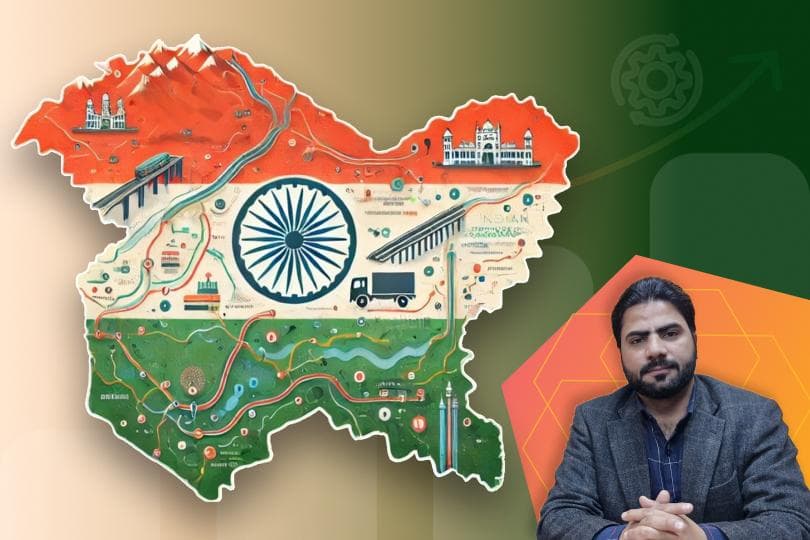Walking The Path Of Peace Part-2
‘The current era in Kashmir calls for valuing every life, embracing democracy, and fostering a peaceful future.’
Sajid Yousuf Shah

To read Part-1, please visit: [Article 1]
Rise of Flag Culture: My Journey into Political Activism in Kashmir
In my quest for change, I joined the BJP to amplify the voices of those unable to express their suffering. One of my significant actions was writing an open letter to Syed Ali Shah Geelani, criticising his hypocrisy regarding cinemas. Geelani desired Kashmir to join Pakistan, a country with numerous cinemas, yet he opposed the existence of cinemas in Kashmir. People already watch movies on their phones; why not on big screens?
Geelani later acknowledged my persistence in a meeting at his residence, noting that I had always been a proud Indian. Having lost my mother to terrorists when I was just eight, I could never support such killers. Yet, some in Kashmir, including politicians, continue to support these elements.
Since 2019, flag culture has surged in Kashmir, led by Major General Sanjay Vishwasrao, whom I call the Flag Man of Kashmir. Lal Chowk, with its iconic clock tower, used to be the epicentre for Hurriyat and the Jammu Kashmir Liberation Front (JKLF). In 2021, after a failed attempt in 2020 due to security concerns, I resolved to hoist the national flag on January 26. Despite the bone-chilling -4°C temperature and snow, I arranged a crane, misleading the driver by claiming I was from the municipality.
With the police informed and prepared to arrest me, a friend and I ascended to place the tricolour on top of the clock tower. The last time Murli Manohar Joshi visited, the flag was hoisted at a lower height. I was the first to place it at the very top, where it proudly flew until the administration removed it due to infrastructure concerns and protocol requiring flag removal after sunset.
I also suggested renaming Lal Chowk to Tiranga Chowk in a letter to the Prime Minister. Though it wasn’t approved, the idea sparked fervent debate. Today, Lal Chowk stands transformed. An event I organised there was attended by the Chief Secretary and LG Manoj Sinha, highlighting its significance and renewed vibrancy.
The Impact of Militancy in Kashmir
Reflecting on the past reveals a stark reality: thousands of Kashmiris have lost their lives without anyone being held accountable. Many once believed in the promise of “Azaadi,” championed by Hurriyat leaders, but the outcome has been grim. Over 45,000 Kashmiris have perished—where is the justice for this tragedy?
Take the case of Manan Wani, a bright individual with a promising future who was my senior in school. Just days before he joined the militants, we shared a meal at our school during the JNV Kupwara Alumni Meet. With proper nurturing, he could have excelled in fields like medicine. Instead, he fell victim to violence—a brilliant mind lost.
In another tragic incident in Bandipora, foreign terrorists from Pakistan demanded the hand of a 13-year-old boy’s sister in marriage. To protect her, the family sent her away, but the terrorists kidnapped and killed her brother. This illustrates a selective condemnation prevalent in Kashmir: deaths by Pakistani bullets are often met with silence, while those by Indian bullets provoke an outcry. Every loss of life is tragic, regardless of who pulls the trigger. Such violence should never occur.
There are instances where individuals sheltered militants and even allowed their daughters to marry them under false pretences. This perpetuates a destructive cycle that Kashmir has now broken free from. The current era calls for valuing every life, embracing democracy, and fostering a peaceful future.
Looking at developments post-2019, despite ongoing questions about progress, the reduction in the loss of innocent lives is the most significant achievement. The BJP played a crucial role in discontinuing the use of pellet guns, saving countless children from harm. Regardless of one’s political stance, acknowledging these efforts is necessary—saving innocent lives marks significant progress forward.
This narrative highlights the transformative power of voting in fostering a peaceful, democratic society. For instance, a poignant video featured a Kashmiri man urging his brother—a terrorist in Pakistan—to forsake militancy and emphasise the crucial role of voting in strengthening democracy. His message advocated for peace and urged participation in the democratic process.
Evolving Political Dynamics in Kashmir
In recent years, there has been substantial development in the sociopolitical arena of Kashmir. For over 32 years, Muharram processions were banned in Kashmir. Despite being under Muslim governance, it was the BJP—a party often portrayed as Hindu-centric—that reinstated these processions. If the BJP truly harboured anti-Muslim sentiments, why would they lift such a ban? This contradiction raises questions about the party’s true intentions. Moreover, since 2019, the closure of mosques has further complicated perceptions of the BJP’s stance towards Muslims, though some instances warrant proper attention when it comes to security concerns.
Previously, voter turnout in Kashmir languished due to coercive tactics by regional political entities. These parties, fearing loss of control, employed violence like grenade attacks and shootings to deter voting, thereby undermining democracy in the region.
Despite the BJP’s current absence of candidates in the Kashmir Valley, the party remains committed to strengthening democracy. They advocate for voter participation, irrespective of party affiliation, endorsed through directives from the Election Commission of India (ECI) and public outreach initiatives.
This landscape has transformed, with J&K making an indelible mark on India’s electoral history with the highest voter turnout in a General Election in the last 35 years at 59%. Formerly anti-election groups, like Jamaat-e-Islami, now advocate for voting, marking a significant societal shift.
Today, Kashmiris openly oppose Pakistan for its double standards. For instance, a Kashmiri seeking to travel or study in Pakistan might only get a visa or an MBBS seat quota if he/she is the child of someone influential. What about the rest of the Kashmiris? If Pakistan claims to be a well-wisher of Kashmir, why do they only support a select few? This suggests they have ulterior motives and aim to keep Kashmir in a state of uncertainty. Above all, they have supported insurgency and used Kashmiris to push forth their own malign agenda. This has been their strategy for the past 70 years and now Kashmirs have understood it quite well.
Impact of Article 370’s Revocation on Kashmir
Article 370 had been exploited by politicians for personal gain long before its formal abrogation. Over time, its provisions, like Forest Land Reservation and GST implementation, were diluted, rendering it largely symbolic by the time the BJP repealed it. While some tied their identity to Article 370, its removal mainly exposed local leaders who had deceived the public with promises of plebiscites and now, post-370, statehood, which the Home Minister has already assured. These leaders focus more on personal security and privileges than on delivering concrete benefits. Its removal revealed political manipulation rather than erasing people’s identities.
Prominent figures who mix religion with politics to stir unrest stand in stark contrast to ground realities. Corruption, once rampant, now faces stricter scrutiny, with the Anti-Corruption Bureau targeting officials even for minor bribes, leading to improved governance.
Since the removal of Article 370, Kashmir has seen accelerated development. Projects like the Sopore Bridge and Reddy Chowk upgrades, stagnant for decades, are finally progressing. Infrastructure enhancements, including new flyovers and roads, have significantly reduced travel times. For instance, the Jammu-Srinagar journey now takes 4-5 hours instead of 12-18, with new tunnels nearing completion, making travel to Delhi feasible within 8 hours.
Additionally, new educational institutions like IIT campuses in Jammu and Pulwama highlight tangible progress. Despite these strides, opposition parties like the National Conference criticise without acknowledging improvements, often sharing misleading images of road conditions.
In summary, the abrogation of Article 370 has revealed the political exploitation that had been occurring for decades. The region is now experiencing real development and improved governance, showing the positive impact of these changes on the lives of ordinary Kashmiris.
Entrepreneurship and IT: Local Success Stories and Innovations
Kashmir, celebrated for its breathtaking landscapes, is concurrently undergoing substantial infrastructure evolution. Ambitious projects, such as the world’s highest railway bridge, numerous tunnels, and the Zojila Pass upgrade linking Srinagar to Leh, are in progress. Proposed tunnels in Karnah and Tangdar further emphasise the region’s commitment to connectivity and development. The development of smart cities, such as the one underway in Srinagar, is pivotal in driving progress.
To combat youth unemployment, initiatives like Mission Youth have been launched, promoting job creation and entrepreneurship. These programmes empower young Kashmiris to establish businesses, thereby creating employment opportunities for others. For instance, opening a new café not only employs locals but also contributes to the growth of the private sector. Such small-scale startups have seen a boom in Kashmir in recent years.
In the Kashmir Valley, numerous entrepreneurs are spearheading job creation efforts. Collaborations like the agreement with the LuLu Group to establish a hypermarket in Srinagar are poised to generate significant employment prospects, supporting economic growth in the region. For example, a friend, who spent 12 years working with an American company in Pune, plans to return to Kashmir to establish a venture. Such initiatives necessitate robust governmental investment in infrastructure. Combatting terrorism transcends the mere elimination of militants; it requires a fundamental reshaping of mindsets. Engaging the youth in technology and sports is imperative. Kashmiri youth, including girls excelling in international sports, serve as beacons of local talent and initiative.
Success stories like that of Javid Parsa, who expanded from a small shop in Raj Bagh to 57 nationwide chains with Kathi Junction, exemplify Kashmir’s potential. Similarly, initiatives such as Sahil’s Waste to Energy project, converting waste into electricity, highlight local innovation and job creation.
Ongoing projects, particularly in infrastructure like highways and schools, coupled with local entrepreneurial investments in franchises like Domino’s and KFC, are fortifying Kashmir’s economy. Local cafes and restaurants, flourishing in the hospitality sector, create employment and bolster community income.
The transportation sector has expanded with local cab services like Nova and Jugnoo, along with online delivery platforms like Swiggy and Zomato gaining traction, providing job opportunities and enhancing transportation infrastructure.
Looking ahead, Kashmir’s IT sector is poised for significant transformation, driven by ongoing government support and peacebuilding efforts. The region has great potential in technology and ethical hacking, with many talented Kashmiris thriving in Bangalore, Pune, and abroad. However, creating local opportunities is crucial to retaining and attracting this talent.
Visits and cultural engagement efforts by Prime Minister Narendra Modi and Home Minister Amit Shah reflect a commitment to bridging gaps and fostering development.
With significant improvements in the political situation, Kashmir has witnessed a record-breaking number of tourists in 2024, expected to surpass all previous highs. In 2023, Jammu and Kashmir experienced a massive influx of visitors, with over 21.1 million tourists arriving, positively impacting the region’s economy, according to the J&K tourism department.
These successes demonstrate that, with adequate support and opportunities, Kashmiris can achieve remarkable economic growth. The abrogation of Article 370 has unlocked new avenues for entrepreneurship, instilling hope and potential for growth. The journey of “Naya Kashmir” has begun, showing great promise right from its inception.
